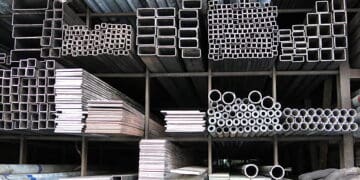The UK government has announced an extension of tariffs on steel imports from countries like China for an additional two years. This move acknowledges the potential violation of World Trade Organization (WTO) regulations.
Anne-Marie Trevelyan, the international trade secretary, defended the decision, stating it was made in the “public interest” to safeguard “thousands” of jobs. She also confirmed an exemption for Ukrainian steel from these tariffs.
The decision has raised concerns about departing from international legal obligations outlined in the relevant WTO agreement. Trevelyan acknowledged the tension between taking action in the national interest and adhering to standard rules and procedures.
Many steel factories are located in crucial “red wall” constituencies, such as Scunthorpe and south Wales, which hold significance in the government’s electoral prospects.
While the move has received support from proponents of protecting domestic industries, it has faced criticism from free-market advocates. Conservative MP Anthony Mangnall expressed support for the steel industry but not through protective measures, emphasizing the need for a commitment to free trade.
The government’s decision extends existing tariffs on five steel categories until June 2024, aligning with the expiration date of tariffs on ten other steel categories, including gas pipes and railway materials.
Gareth Stace, director of trade body UK Steel, welcomed the decision, emphasizing its importance in protecting against import surges that could threaten jobs, investments, and the transition to a net-zero economy.
Nick Thomas-Symonds, the shadow international trade secretary, also welcomed the move as relief for the steel industry and a means to maintain a level playing field against cheap imports. However, he stressed that it did not fully address the government’s broader shortcomings in supporting the industry.
He expressed surprise at the government’s decision to extend tariffs despite the potential WTO rule breach, urging the release of the Trade Remedies Authority analysis that led to this advice.
Lord Geidt, Boris Johnson’s former ethics adviser, had raised concerns about the tariff extension plans in his letter of resignation, emphasizing the risk of deliberately breaching the ministerial code. While he later clarified his remarks, he maintained that the tariff policy proposal exemplified potential breaches of international law obligations.
Trevelyan added that further analysis by the Trade Remedies Authority had confirmed the risk of serious harm if the safeguard on the additional steel categories were removed at this time.
Stay informed on supply chain news at The Supply Chain Report. Free international trade tools are at ADAMftd.com.
#SteelTariffs #UKSteel #TradePolicy #WTOCompliance #SteelIndustry #TradeRemedies #NetZeroTransition #ImportProtection #UkrainianSteel #FreeTradeDebate















